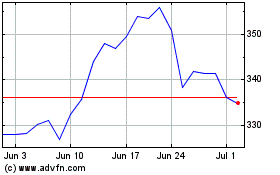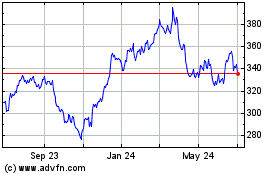Today's Top Supply Chain and Logistics News From WSJ
June 28 2016 - 7:08AM
Dow Jones News
By Paul Page
Sign up: With one click, get this newsletter delivered to your
inbox.
Home Depot Inc.'s supply chain chief is telling store operators
to get used to "days of inventory, not weeks." The home-improvement
giant is joining a growing retail industry drive to slash stocks at
stores and in warehouses as companies try to boost sales, improve
margins and respond to changes in the marketplace. Companies
including Home Depot, Target Corp. and Wal-Mart Stores are trying
to figure out how to profitably serve the growing needs of online
shoppers even as they make their network of stores less of a
financial burden, the WSJ's Paul Ziobro writes. Home Depot calls
its plan "Project Sync," which includes a steadier flow of
deliveries from suppliers into its network of 18 sorting centers.
Instead of being slammed with five trucks twice a week, for
instance, Home Depot now wants to have suppliers send two trucks
five days a week. Retailer lean-inventory efforts have been roiling
the logistics world, with operators reporting fewer goods in
distribution channels even as consumer sales tick upward. For
retailers, though, that's how supply-chain math is supposed to add
up.
EZ Worldwide Express is finding out why tying too much business
to a single customer isn't very fashionable in logistics. The New
Jersey-based operator is dropping Forever 21 as a customer after
saying the retailer's diminishing business pushed the company into
bankruptcy protection, the WSJ's Katy Stech reports. The January
bankruptcy filing and the decision in recent days to walk away from
the service contract point to the changes coursing through the
"fast fashion" trade and to the impact the upheaval is having on
logistics providers. EZ Worldwide laid off 200 workers and is
selling equipment it had used to serve a client that had provided
some half of the company's revenue. EZ Worldwide points to sharply
declining revenues, a sign of the scale of the toll that changing
consumer tastes and the sales shift toward e-commerce are taking on
Forever 21.
The world-wide business serving apparel retailers is creating a
kind of vast shadow supply chain from castoffs. The business of
recycling used clothing stretches from Western stores to sorting
shops in India and has built its own logistics eco-system, the
WSJ's Eric Bellman reports. It now faces a glut of goods that is so
large it is affecting retailers and regional economic policies. The
surplus springs from the rise of fast fashion, which has flooded
the world with inexpensive clothing, often produced in the same
low-wage countries where it later ends up sold or reprocessed into
goods like blankets or pillow stuffing. It may seem a virtuous
circle, but some clothing makers in emerging markets say the flood
of used apparel stifles the growth of local textile industries. And
there are signs the global recycling system is having trouble
keeping up with the relentless march of new production.
TRANSPORTATION
New U.S. rules on drone operations break new ground on the
devices even if they don't go as far as delivery companies would
like. The long-awaited regulations the Federal Aviation
Administration issued permit low-altitude, daylight flights of
unmanned vehicles weighing less than 55 pounds, although the WSJ's
Andy Pasztor reports they will continue to stick to requirement
that drones can't fly outside the sight of an operator. That puts a
heavy lid over studies Amazon.com Inc. and other companies have
undertaken on the use of drones to deliver parcels. The FAA rules
will open the skies to far more private-sector use of drones,
however, and the growing commercial use will likely spur more
investment and research on the technology. Setting the industry
parameters may open the door to using drones for remote or
emergency deliveries, which some parcel carriers believe that they
are most likely to fit.
QUOTABLE
IN OTHER NEWS
More British companies are issuing profit warnings as they
digest the impact of the U.K. vote to withdraw from the European
Union. (WSJ)
Intensifying pressure on the British pound pushed sterling to
its lowest level against the dollar in 31 years. (WSJ)
Oakland's city council voted to ban exports of coal from the
city's terminals. (WSJ)
The Chinese yuan fell to its lowest level against the dollar
since late 2010 after China's central bank acted in response to
volatile global currency markets. (WSJ)
The U.S. plans "informal, technical discussions" with the United
Arab Emirates and Qatar about Persian Gulf airlines' funding and
access to the U.S. market. (WSJ)
The U.S. trade gap widened slightly in May on a small increase
in imports. (MarketWatch)
Medical-device maker Medtronic Plc agreed to acquire HeartWare
International Inc., adding more heart-failure products to its
portfolio. (WSJ)
The Brexit vote may endanger efforts to expand London Heathrow
Airport. (The Guardian)
Perdue Farms Inc. is retooling its sourcing to ensure that its
chickens are raised in a humane manner. (The New York Times)
English authorities are asking port workers to look for signs of
slave labor on ships arriving at terminals. (BBC)
Worldwide raw steel production expanded 3.2% from April to May.
(American Machinist)
Amazon,com has the greatest overall web traffic among e-commerce
companies in India. (Forbes)
A new report says Canadian retailers are about two years behind
U.S. companies in adopting e-commerce technology. (Toronto
Star)
China's No. 2 steel maker and a smaller rival are planning a
strategic partnership that could lead to a merger. (South China
Morning Post)
South Korean shipyard Daewoo Shipbuilding & Marine
Engineering must raise $871 million to meet September bond
payments. (Splash 24/7)
The head of the U.S. government's Strategic National Stockpile
says the program's series of warehouses hold $7 billion in supplies
in case of national disaster. (NPR)
ABOUT US
Paul Page is deputy editor of WSJ Logistics Report. Follow him
at @PaulPage, and follow the entire WSJ Logistics Report team:
@brianjbaskin, @lorettachao, @RWhelanWSJ and @EEPhillips_WSJ, and
follow the WSJ Logistics Report on Twitter at @WSJLogistics.
Subscribe to this email newsletter by clicking here:
http://on.wsj.com/Logisticsnewsletter .
(END) Dow Jones Newswires
June 28, 2016 06:53 ET (10:53 GMT)
Copyright (c) 2016 Dow Jones & Company, Inc.
Home Depot (NYSE:HD)
Historical Stock Chart
From Aug 2024 to Sep 2024

Home Depot (NYSE:HD)
Historical Stock Chart
From Sep 2023 to Sep 2024
